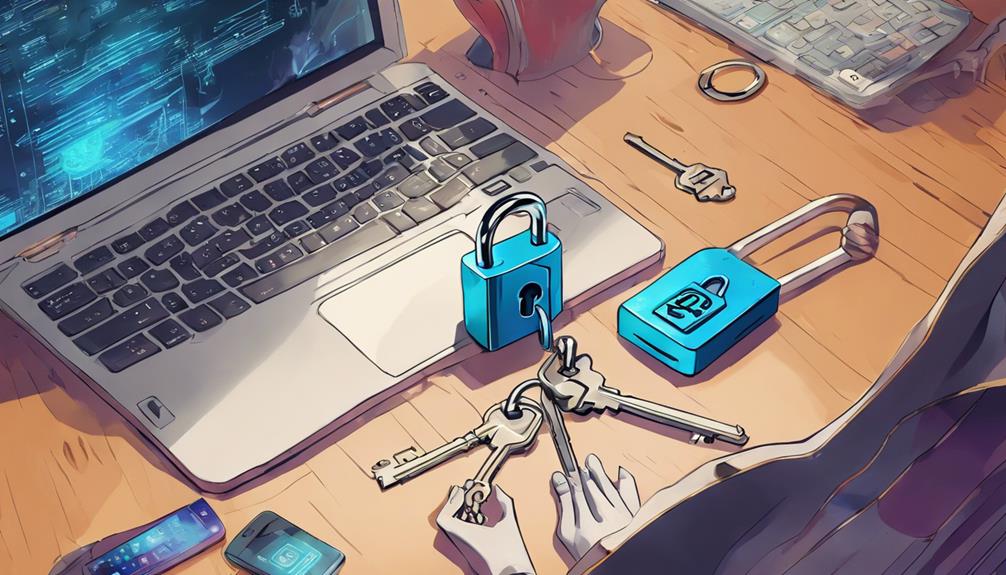Ethical hacking, a practice involving authorized cybersecurity testing, comes with its set of advantages and disadvantages. On one hand, it plays a vital role in fortifying security measures by identifying vulnerabilities, preemptively thwarting cyber threats, and safeguarding sensitive data. This proactive approach promotes a culture of security and builds stakeholder confidence. However, ethical hacking also poses legal risks, potential breaches of confidentiality, and must be carefully managed to mitigate these drawbacks. Understanding the balance between the benefits and risks of ethical hacking is essential for organizations to enhance their cybersecurity practices effectively.
Key Takeaways
- Ethical hacking is beneficial for identifying system vulnerabilities and strengthening security measures.
- It promotes a proactive security culture and safeguards sensitive data.
- However, legal implications and risks must be managed to ensure compliance and confidentiality.
- Responsible implementation guidelines, such as authorization and thorough security assessments, are crucial.
- Overall, ethical hacking enhances organizational security by preemptively thwarting cyber threats.
The Ethics of Ethical Hacking
One fundamental aspect of ethical hacking lies in upholding the principles of integrity and responsibility while conducting authorized security assessments. Ethical hackers play a significant role in identifying system vulnerabilities and strengthening security measures to prevent cyber attacks. By proactively addressing weaknesses in networks and systems, ethical hacking aims to enhance the security posture of organizations, promote a proactive security culture, and stay ahead of cybercriminals.
Ethical hackers are granted permission to conduct assessments and notify organizations about potential security risks, ensuring that any vulnerabilities are addressed promptly. Legal and ethical considerations are paramount in maneuvering through the complexities of ethical hacking practices, helping to maintain a responsible approach to cybersecurity.
Benefits of Ethical Hacking

Ethical hacking offers a multitude of benefits to organizations aiming to fortify their cybersecurity defenses. By actively identifying vulnerabilities, ethical hackers help preemptively thwart potential cyber threats, thereby bolstering overall security measures.
This proactive approach not only safeguards sensitive data but also instills confidence in stakeholders regarding the reliability of the systems in place.
Enhances Security Measures
Enhancing security measures through ethical hacking involves the proactive identification and remediation of vulnerabilities within systems and networks. By leveraging the skills of ethical hackers, organizations can fortify their network security defenses, thereby reducing the risk of falling victim to cyber attacks and data breaches. Ethical hacking serves as a preemptive strategy to identify and address potential security weaknesses before malicious actors exploit them for nefarious purposes.
This approach not only safeguards sensitive information but also helps in maintaining the trust of customers and stakeholders who rely on secure systems for their transactions and interactions.
Ethical hackers act as valuable assets by diligently reporting security holes and vulnerabilities, enabling organizations to implement timely patches and updates to mitigate risks effectively. Through their efforts, ethical hacking contributes substantially to proactive defense mechanisms that strengthen overall security posture.
Moreover, the demand for skilled professionals in ethical hacking continues to rise, presenting abundant career opportunities in the field of cybersecurity for those adept at identifying and addressing security vulnerabilities.
Identifies Vulnerabilities Effectively
Effectively pinpointing vulnerabilities in systems and networks, ethical hacking serves as an important strategy to bolster cybersecurity defenses and preempt potential cyber threats.
By conducting simulated attacks and penetration testing, ethical hackers can uncover weaknesses in organizations' IT infrastructure that could be exploited by malicious actors. This process allows organizations to identify and rectify security flaws before they are compromised, thus minimizing the risk of data breaches and other cyber incidents.
Through the meticulous examination of systems, ethical hacking helps organizations stay ahead in the cybersecurity game, ensuring that sensitive data remains protected from unauthorized access. By working closely with IT teams, ethical hackers provide valuable insights into potential entry points for cyber attackers, enabling organizations to fortify their defenses and enhance their overall security posture.
Alternative words for ethical hacking act as a vital tool in the arsenal of cybersecurity measures, helping organizations proactively safeguard their digital assets from evolving cyber threats.
Mitigates Potential Cyber Threats
By proactively identifying and addressing security vulnerabilities, ethical hacking serves as a valuable asset in mitigating potential cyber threats faced by organizations. Ethical hackers, also known as White Hat hackers, identify weaknesses in the system security of businesses and help prevent cyber attacks. Through conducting thorough security assessments, these professionals play an essential role in enhancing cyber security measures, ultimately reducing the risk of data breaches and other malicious activities.
By taking a proactive approach to cybersecurity, organizations can stay ahead of potential attackers and strengthen their defense mechanisms.
One of the key advantages of ethical hacking is the trust it builds with customers and stakeholders. By implementing robust security measures based on ethical hacking findings, organizations demonstrate their commitment to protecting sensitive data and maintaining the integrity of their systems.
Moreover, ethical hacking provides valuable career opportunities in the cybersecurity industry, where professionals work tirelessly to safeguard information and infrastructure from cyber threats.
Risks Associated With Ethical Hacking

Ethical hacking aims to improve security by identifying vulnerabilities within a system. This practice involves simulating potential attacks to help organizations strengthen their defenses. By proactively identifying and addressing weaknesses, ethical hackers assist in fortifying cybersecurity measures.
Organizations must carefully manage the legal implications that can arise from unintentional breaches of confidentiality during ethical hacking activities. This includes ensuring that sensitive data is protected and that all activities comply with relevant regulations and laws. Proper safeguards and adherence to compliance standards are crucial for organizations to navigate these risks effectively.
Potential Legal Implications
When engaging in hacking activities, whether for security testing or vulnerability assessment, individuals must be mindful of the potential legal implications that could arise. Ethical hacking can lead to legal risks if not conducted within the boundaries of the law and without proper authorization.
Unauthorized penetration testing can result in legal consequences due to potential data breaches or system disruptions. Companies must make sure ethical hackers adhere to legal guidelines to prevent legal liabilities and privacy infringements.
- Violating data protection laws
- Breaching confidentiality agreements
- Facing lawsuits
- Privacy infringements
To mitigate legal risks, organizations should establish clear guidelines, obtain consent, and work with certified ethical hackers. It is important for both individuals and companies to understand the legal boundaries and implications of ethical hacking to protect themselves from potential legal consequences.
Breach of Confidentiality
During security assessments, ethical hacking poses a significant risk of breaching confidentiality when sensitive data is inadvertently accessed.
The accidental exposure of confidential information to unauthorized parties is a common risk associated with ethical hacking. Unauthorized access to confidential databases or files during ethical hacking activities can lead to breaches of confidentiality, potentially causing severe consequences for the organization involved.
To mitigate these risks, organizations must implement strict protocols and closely monitor the access and handling of sensitive data during ethical hacking processes.
Maintaining a balance between conducting thorough security assessments and safeguarding confidential information is vital in the ethical hacking domain.
Role of Ethical Hacking in Cybersecurity

Playing a critical role in bolstering cybersecurity defenses, ethical hacking serves as a proactive measure to identify vulnerabilities in networks and systems. Ethical hackers, with proper authorization, conduct security assessments to pinpoint weaknesses and inform organizations about any discovered vulnerabilities promptly.
The primary goal of ethical hacking is to enhance the overall security posture of organizations by addressing and fixing potential security loopholes before malicious actors exploit them. This practice promotes a proactive security culture, enabling companies to stay one step ahead of cybercriminals and prevent data breaches effectively.
- Ethical hacking aids in identifying and patching vulnerabilities in systems and networks.
- Authorization is essential for ethical hackers to conduct security assessments effectively.
- The main objective is to enhance the security posture of organizations by addressing security weaknesses promptly.
- Ethical hacking helps in fostering a proactive security approach to prevent data breaches and cyber threats.
Impact on Organizational Security

Ethical hacking greatly enhances organizational security by proactively identifying and addressing vulnerabilities to prevent potential exploitation by malicious actors. By simulating real-world cyber threats, ethical hackers help organizations strengthen their defenses and fortify systems against potential attacks. Through thorough security assessments, these experts can pinpoint weaknesses in networks, applications, and infrastructure, offering valuable insights for remediation.
This proactive approach enables organizations to stay one step ahead of cybercriminals, reducing the likelihood of data breaches and unauthorized access to sensitive information. Implementing ethical hacking practices not only bolsters the overall security posture of organizations but also fosters trust with customers and stakeholders who rely on robust data protection measures.
As cyber threats continue to evolve in complexity and sophistication, the role of ethical hacking in organizational security becomes increasingly crucial for safeguarding valuable assets and maintaining operational resilience.
Responsible Implementation of Ethical Hacking

Implementing ethical hacking practices requires careful consideration of legal and ethical boundaries to guarantee responsible conduct in cybersecurity assessments. Ethical hackers must follow specific guidelines to make sure their actions are authorized and conducted in a manner that prioritizes security without causing harm. To achieve responsible implementation of ethical hacking, the following key points should be emphasized:
- Authorization: Obtaining permission before engaging in security assessments is vital to avoid legal repercussions and maintain ethical standards.
- Security Assessments: Ethical hackers should focus on conducting thorough security assessments to identify and address vulnerabilities within systems and networks.
- Vulnerabilities: Identifying and reporting vulnerabilities to organizations is essential for enhancing their security posture and preventing potential cyber attacks.
- Compliance: Adhering to data protection laws and privacy regulations is crucial to ensuring ethical hacking practices align with legal requirements and ethical norms.
Responsible implementation of ethical hacking not only strengthens cybersecurity measures but also fosters a culture of proactive defense against cyber threats.
Frequently Asked Questions
What Is Ethical Hacking and What Are Its Pros and Cons?
Ethical hacking involves authorized attempts to identify system vulnerabilities to bolster security. Its pros include enhancing security measures, preventing breaches, and fostering proactive security mindsets. However, misuse risks legal and ethical issues, system disruptions, and moral dilemmas.
Is Ethical Hacking a Good Thing?
Is ethical hacking a good thing? Ethical hacking is integral to fortifying cybersecurity through proactive vulnerability assessments, aiding in preventing cyber threats. Its benefits include identifying weaknesses, enhancing security measures, and minimizing data breaches.
Are Hackers Good or Bad?
Hackers possess diverse intentions and skill levels, ranging from criminal hackers exploiting vulnerabilities for malicious purposes to ethical hackers using their expertise to enhance cybersecurity defenses. Understanding these distinctions is vital in addressing cybersecurity threats effectively.
What Are the Pros and Cons of Computer Hacking?
Computer hacking, whether ethical or not, presents advantages like identifying security weaknesses and enhancing defenses. However, it also poses risks such as legal implications, unintended system disruptions, and potential data breaches if not conducted prudently and within legal boundaries.
Conclusion
In summary, ethical hacking can be both beneficial and risky, depending on how it is implemented. It plays a vital role in enhancing cybersecurity and protecting organizations from cyber threats.
However, it is important to make sure that ethical hacking is conducted responsibly to avoid any negative consequences. As with any tool, ethical hacking should be used wisely and with caution to achieve the desired outcomes without causing harm.
Remember, with great power comes great responsibility.









